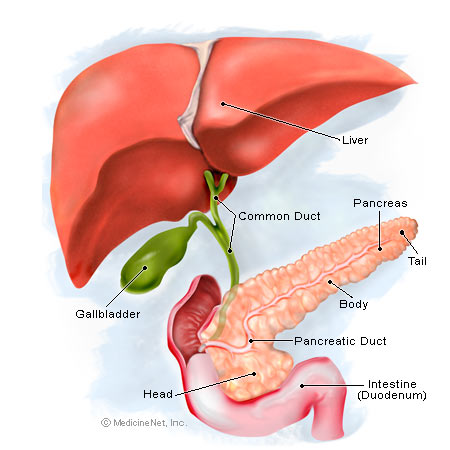
Common Complications Of Pancreatic Cancer – Pancreatic Cancer – causes – Symptoms – Treatment of Pancretic Cancer
Pancreatic cancer is one disease that affects the pancreas. The pancreas is a gland located in the back of the upper stomach close to the backbone. The pancreas has several functions; the main two are that it makes pancreatic juices and several hormones including insulin. Cancer is the growth and splitting up of cells in an unrestraint way. Cells become cancerous when the control mechanisms that manage cell growth don’t work. The cells continue to grow uncontrollably and in due course form a malignant tumor.
Pancreatic Cancer Causes
The exact as to what damages DNA in the vast majority of cases of pancreatic cancer is not clear. in other words the exact pancreatic cancer causes are not clear. But it is known that a small percentage of people develop the disease as a result of a genetic predisposition. These people who have a close relative, such as a parent or sibling, with pancreatic cancer have a higher risk of developing pancreatic cancer themselves.
Age: is also a factor to be considered which increases the incidence of the disease. as age increases the probability of pancreatic cancer also increases. The incidence of Pancreatic Cancer is relatively low in individuals up to age 50, after which it increases significantly. The age group 65 – 79 has the highest incidence of Pancreatic Cancer.
Symptoms and Diagnosis:
Pancreatic cancer is a ‘silent’ disease: There is no symptom at the early stage, nor is there a reliable screening test for early detection.
As the tumor grows, pain is often felt in the upper abdomen and sometimes, the back. The pain is exacerbated after meals or when lying down. other symptoms include loss of appetite, weight loss, nausea and general fatigue.
If the common bile duct were blocked by the tumor, symptoms of jaundice appear: The skin and whites of the eyes turn yellow and the color of urine darkens.
Treatment Options for Pancreatic Cancer
The treatment plan for pancreatic cancer differs from patient to patient. when established, treatment plans are based on several factors such as the stage and location of the cancer, the patient’s age and general health state.
Potentially curative surgery is a type of surgery that can be performed when the cancer can be removed. Potentially curative surgeries are performed when the cancer has started in the head of the pancreas (near the bile duct). Cancer of the head of the pancreas is easily detected by the symptoms it produces such as jaundice which is caused by the bile duct blockage.
Palliative surgery is a type of surgery chosen when the tumor is too widespread. The purpose of this surgery is to relieve the symptoms or complications caused by the cancer.
This cancer is difficult to diagnose because there are no symptoms in the early stages and because , when symptoms appear, they match other diseases. Depending on the stage and location of the cancer, surgery, chemotherapy and/or radiation therapy may be used. If the cancer has not spread beyond the pancreas, therapy can be successful, but, as stated earlier, it’s very unlikely to find pancreatic cancer in the early stages. in later stages, often the therapy concentrates on the comfort of the patient.
Apple’s Steve Jobs likely stricken with one of two conditions, experts sayMedical experts say there are two likely reasons why patients such as Apple CEO Steve Jobs, with pancreatic cancer and a new liver, need time off: complications from the transplant or recurrence of the tumor.
en.wikipedia.org Randolph Frederick “Randy” Pausch[3] (October 23, 1960 July 25, 2008) was an American professor of computer science and human-computer interaction and design at Carnegie Mellon University (CMU) in Pittsburgh, Pennsylvania. Pausch learned that he had pancreatic cancer, a terminal illness, in September of 2006. He gave an upbeat lecture entitled “The Last Lecture: really Achieving your Childhood Dreams” on September 18, 2007 at Carnegie Mellon, which became a popular YouTube video and led to other media appearances. He then co-authored a book called The Last Lecture on the same theme, which became a new York Times best-seller. Pausch died of complications from pancreatic cancer on July 25, 2008.Video Rating: 5 / 5
Common Complications Of Pancreatic Cancer
More : Common Complications Of Pancreatic Cancer